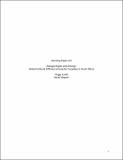| dc.contributor.author | Levitt, Peggy | |
| dc.contributor.author | Wagner, Sarah | |
| dc.date.accessioned | 2015-07-01T16:47:40Z | |
| dc.date.available | 2015-07-01T16:47:40Z | |
| dc.date.issued | 2003-09 | |
| dc.identifier.uri | http://hdl.handle.net/1721.1/97614 | |
| dc.description.abstract | Every day the media is filled with examples of the ways in which contemporary social, economic, and political life transcends national borders. Some researchers argue that these dynamics attest to the emergence of a global civil society, based on a set of universal norms and practices that works in tandem with or may even supercede national politics. Yet we know little about the ways in which global institutions resonate with the everyday lives of individuals and with the organizations that actually serve people on the ground. How do ordinary people learn about and conceptualize these universal rights and how do they claim them? To what extent do NGOs articulate comparable notions about rights, pursue common strategies to achieve them, and by so doing, contribute to this emerging architecture of transnational governance? This paper uses the case of Congolese refugees in South Africa to explore these questions. It examines how individuals learn about and use global norms and practices and how this learning process varies in their home and host-country context. It also explores the extent to which organizations operating both locally and internationally are exposed to a set of global approaches and expectations and how these influence how things get done. | en_US |
| dc.language.iso | en_US | en_US |
| dc.publisher | Inter-University Committee on International Migration | en_US |
| dc.relation.ispartofseries | Rosemarie Rogers Working Paper Series;23 | |
| dc.title | Refugee Rights and Wrongs: Global Cultural Diffusion among the Congolese in South Africa | en_US |
| dc.type | Working Paper | en_US |
